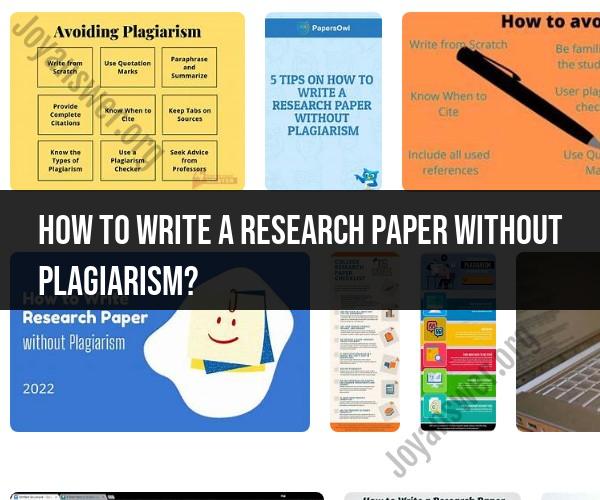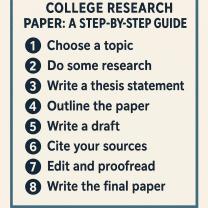How to write a research paper without plagiarism?
Writing a research paper without plagiarism is essential to maintain academic integrity and ensure that your work is original and properly attributed. Here are some guidelines and tips to help you write a plagiarism-free research paper:
Understand What Constitutes Plagiarism:
- Familiarize yourself with the various forms of plagiarism, which can include copying someone else's words or ideas without proper attribution, self-plagiarism (reusing your own work without citation), and paraphrasing without giving credit, among others.
Start with Thorough Research:
- Begin your research with reputable sources such as academic journals, books, and scholarly databases. Take detailed notes and keep track of your sources from the outset.
Cite Sources Properly:
- Use a recognized citation style (e.g., APA, MLA, Chicago) consistently throughout your paper.
- Attribute all ideas, facts, statistics, and direct quotations to their original sources. Use in-text citations and create a reference list or bibliography.
Paraphrase and Summarize Ethically:
- If you need to paraphrase or summarize someone else's work, ensure that you fully understand the material, then rephrase it in your own words while maintaining the original meaning.
- Still, provide proper citation when paraphrasing or summarizing, as it's not enough to change a few words.
Use Quotations Appropriately:
- When quoting directly from a source, use quotation marks to indicate the exact words of the author. Include an in-text citation and page number (if applicable).
- Keep direct quotations concise and use them sparingly; most of your paper should be in your own words.
Give Credit for Common Knowledge:
- Information that is considered common knowledge (e.g., widely accepted facts or historical events) may not require citation. However, be cautious and check whether your audience would consider it common knowledge.
Organize Your Research and Ideas:
- Create an outline or a structured plan for your paper. This helps you organize your thoughts and ensures that you integrate sources seamlessly.
Use Plagiarism Detection Tools:
- Consider using plagiarism detection software or online tools to check your paper for unintentional plagiarism. Many universities provide access to such tools.
Revise and Edit Carefully:
- Review your paper thoroughly for any instances of plagiarism, improper citations, or missing references.
- Edit for clarity, coherence, and consistency in citation style.
Seek Guidance and Feedback:
- If you're unsure about how to cite a source or if your paper may contain unintentional plagiarism, consult with your instructor or a writing center for guidance.
Plan Your Time:
- Avoid last-minute rushes, as they may lead to unintentional plagiarism. Plan your research and writing schedule to allow for thorough review and editing.
Honor Academic Integrity Codes:
- Follow your institution's academic integrity policies and codes. Understand the consequences of plagiarism, which can range from failing an assignment to academic probation or expulsion.
Develop Your Own Voice:
- Focus on developing your unique perspective and voice in your research paper. Engage critically with the sources you use and provide your insights and analysis.
Remember that the goal of a research paper is not merely to summarize existing literature but to contribute to the academic conversation with your own ideas and analysis. Properly citing your sources and giving credit to others is an integral part of scholarly writing.
Crafting a Plagiarism-Free Research Paper: A Comprehensive Guide
Plagiarism is the act of using someone else's work or ideas without giving them credit. It is a serious academic offense, and it can have serious consequences, such as failing a class or being expelled from school.
There are many ways to avoid plagiarism in a research paper. Here are a few tips:
- Keep track of your sources. As you are doing your research, be sure to keep track of all of the sources you consult. This includes books, articles, websites, and other materials.
- Paraphrase and quote correctly. When you paraphrase a source, you are putting the information into your own words. When you quote a source, you are copying the information word-for-word. Be sure to enclose all direct quotes in quotation marks and to cite the source properly.
- Use a plagiarism checker. A plagiarism checker is a tool that can scan your paper for instances of plagiarism. There are many free and paid plagiarism checkers available online.
Here are some additional tips for writing a plagiarism-free research paper:
- Start early. The earlier you start writing your paper, the more time you will have to do your research and to write your paper in your own words.
- Take good notes. As you are doing your research, take good notes on the information you find. Be sure to include the source of the information in your notes.
- Organize your thoughts. Once you have finished your research, organize your thoughts before you start writing your paper. This will help you to write a clear and concise paper.
- Proofread your paper carefully. Before you submit your paper, be sure to proofread it carefully for any errors in grammar, spelling, or punctuation. You should also proofread your paper for any instances of plagiarism.
Writing with Integrity: Tips for a Research Paper Without Plagiarism
Plagiarism is not only unethical, but it can also damage your reputation as a student or scholar. Here are some tips for writing with integrity and avoiding plagiarism in your research paper:
- Be honest and transparent. Be honest about your sources and give credit where credit is due.
- Understand the different types of plagiarism. There are many different types of plagiarism, including direct plagiarism, paraphrasing plagiarism, and mosaic plagiarism. Be sure to understand the different types of plagiarism so that you can avoid them.
- Use citation tools correctly. There are a number of different citation styles, such as MLA, APA, and Chicago. Be sure to use the correct citation style for your paper and to cite your sources correctly.
- Get help if you need it. If you are not sure about something, ask for help from your professor, a librarian, or a writing tutor.
Ethical Research Writing: Avoiding Plagiarism Pitfalls
Here are some additional tips for avoiding plagiarism pitfalls in your research paper:
- Don't copy and paste. It is never okay to copy and paste text from a source into your paper without giving credit to the source.
- Don't use paraphrasing tools. Paraphrasing tools can be helpful, but they should not be used as a substitute for your own work. Be sure to carefully check any text that you generate using a paraphrasing tool to make sure that it is accurate and that it is not plagiarized.
- Don't buy or sell papers. It is never okay to buy or sell a research paper. This is considered plagiarism, and it is a serious academic offense.
By following these tips, you can write a plagiarism-free research paper that is honest, ethical, and original.











